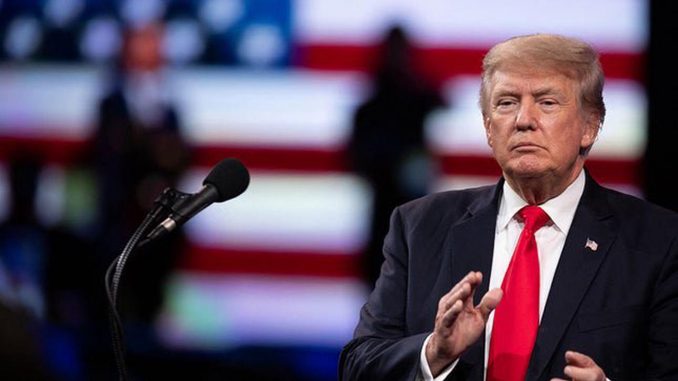
Former President Trump is persevering with his attempts to rewrite the history of the Jan. 6 insurrection at the U.S. Capitol.
It is an effort that is being aided by his political and media allies.
It also threatens to inflame his supporters anew, ruin any chance of anything resembling a national consensus on the riot and pour new gas on the fires of political tribalism.
A poll from The Economist and YouGov released last week pointed to the depth of the split.
Fifty-two percent of Americans said Trump bore “a lot” or “some” responsibility for the storming of the Capitol. But 30 percent of adults — and 64 percent of Republicans — asserted that he bore “none.”
The vigor of Trump’s efforts to bend public perceptions about the insurrection is a backhanded acknowledgement that the events of Jan. 6 did him lasting political damage.
But the way he tries to ameliorate the harm to himself — by erasing reality and replacing it with a more forgiving narrative — causes deeper problems for the nation’s politics.
The latest example came in an interview with Maria Bartiromo of Fox News Channel broadcast on Sunday.
Trump claimed, without contradiction from Bartiromo, that there was a “lovefest” between police and “the people who walked down to the Capitol.”
In fact, around 140 police officers were injured in prolonged violent clashes — clashes of which there is abundant video evidence.
Erik Wemple of The Washington Post noted on Monday — citing CBS News — that more than 50 people have been charged with using a deadly or dangerous weapon or causing serious bodily injury to an officer.
During other parts of his interview, Trump claimed that the speech he gave close to the White House shortly before the riot was “mild-mannered.”
In fact, Trump used those remarks to insist that the presidential election had been stolen from him and told his supporters, “If you don’t fight like hell, you’re not going to have a country anymore.”
The speech was one big reason Trump became the only president in history to be impeached on two separate occasions. Ten House Republicans voted to impeach Trump for “incitement of insurrection.”
Trump’s claims in the Fox News interview also encompassed innuendo about the death of Ashli Babbitt, the rioter who was fatally shot close to the House chamber.
Trump implied that whoever shot Babbitt was the head of security for a senior Democrat and that unnamed forces were “protecting” that person. He provided no evidence to back up either charge.
Trump’s critics, including some within the GOP, see an element of desperation — and danger — in his attempts to wriggle away from his own culpability.
“As the truth becomes more clear and more obvious, his lies become bigger and more absurd,” former Rep. Barbara Comstock (R-Va.) told this column. “You think that there’s a bottom, and he keeps digging.”
Comstock, a vigorous Trump critic, is also a friend of Rep. Liz Cheney (Wyo.), who is probably the most ardent foe of the former president among elected Republicans on Capitol Hill.
Cheney recently accepted an invitation from Speaker Nancy Pelosi (D-Calif.) to serve on the House select committee that will investigate the riot.
Comstock said that she herself would have preferred an independent commission but noted that even a select committee would be able to subpoena information — something that she expects to be damning of Trump.
“Everything he says flies in the face of the facts we can see in front of us,” Comstock said.
Liz Mair, a Republican strategist and another Trump critic, said she believed that Trump “must on some level” understand the magnitude of Jan. 6.
“Otherwise, he wouldn’t be trying to rewrite history,” she added.
But Mair also asserted that it was unlikely people had changed their minds about Jan. 6 one way or another.
“There aren’t new converts to the cause of him being blameless. Whatever people’s views were on Jan. 6, I think that is still their view now,” she said. “So either they don’t think he bore responsibility or don’t think it was that bad, or there are people who were absolutely horrified by what they saw and no amount of ‘explanation’ is going to detract or distract from what they saw on camera.”
There is a related question, too, about how much opinions of Trump broadly are likely to change at this point.
Those who loathe him and those who love him are largely set in their views — and anecdotal evidence suggests there are plenty of Americans who may be relieved to no longer have to think of him on a daily basis.
But Trump continues to at least float the idea of a run for the presidency in 2024.
When Republicans start mulling their choices in that regard, they will have to decide what they think about a man who, for many Americans, still carries the taint of one of the nation’s darkest recent days.
“His ego simply requires him to rewrite the history of Jan. 6,” said Allan Lichtman, a history professor at American University. “But there is no way he is going to build a majority coalition around those kinds of grievances.”
Those grievances can, however, be dangerous all by themselves.
Via The Hill


